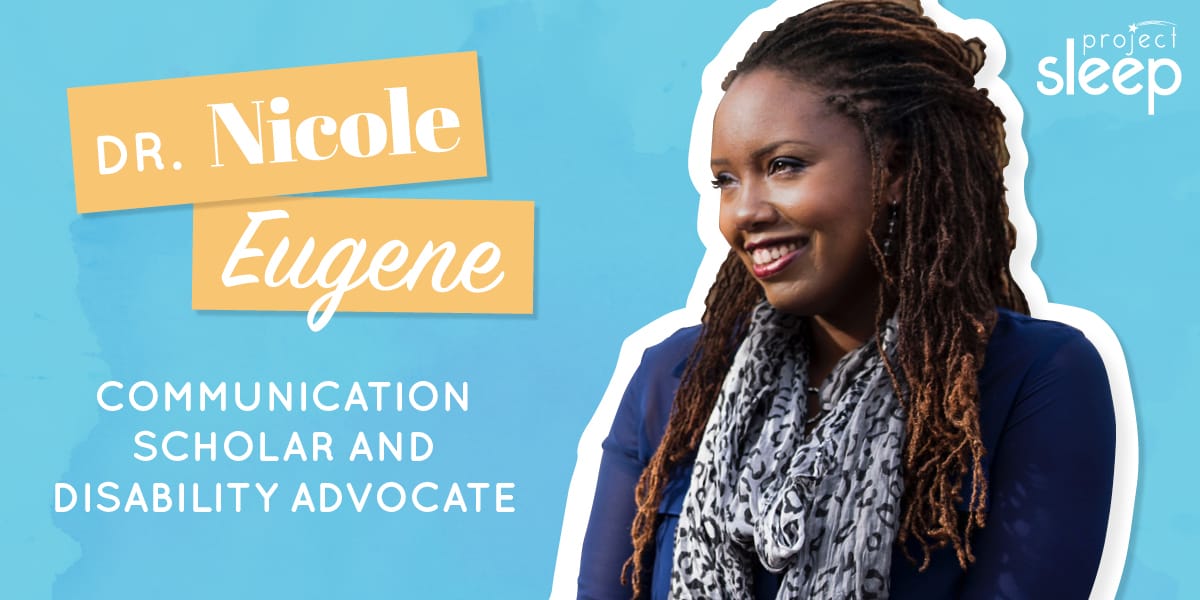Written by Anna Marr. Graphics by Eleanor Wales.
Dr. Nicole Eugene: Black History Month Sleep Leaders Part 2
To celebrate Black History Month, Project Sleep is honored to highlight incredible accomplishments and contributions of Black Americans from across the sleep field—from scientists to advocates. Please join us in celebrating Black excellence by spreading the word about these sleep community leaders!

Meet Dr. Nicole Eugene!
Nicole Eugene, PhD, is a communication scholar, disability advocate, and scholar-artist, as well as an Assistant Professor of Communication at the University of Houston-Victoria. She holds a PhD in Communication Studies from Ohio University, a Master’s in American Cultural Studies from Bowling Green State University, and a Bachelor’s in Sociology and Art from Spelman College.
Dr. Eugene’s research embraces the intersection of health communication and disability studies, particularly hidden disabilities. Notably, she engages in autoethnography, an approach that draws upon her personal experiences to analyze societal experiences—like “the experience of navigating a visual culture with a hidden disability.” (University of Houston-Victoria)
Diagnosed with narcolepsy as a teenager, Dr. Eugene’s experience as an undergraduate with narcolepsy inspired her Master’s program research: the social and cultural understandings of sleepiness. After her Master’s, she moved to New Orleans, only to be immediately evacuated due to Hurricane Katrina. She then joined the “Surviving Katrina and Rita in Houston” project, interviewing fellow survivors and, later, working to use their stories to initiate a play produced by the University of Houston.
From “Poetic Narratives of Teaching with a Hidden Disability” to “Perusing Interpretations of Muhammad Ali’s Disability,” Dr. Eugene’s numerous publications often marry creativity, personal experience, and academic research. In 2013, she published a personal narrative, “Working While Narcoleptic,” in the Anthropology of Consciousness Journal. Her dissertation, “Sleeping Everywhere: Narrating How People with Narcolepsy Navigate Everyday Life,” explores how people with narcolepsy navigate specific spaces like home, work, driving, and leisure.
When interviewing people with narcolepsy, she draws on her own history of being unaware of what she was experiencing. She explains:
This dissertation sought to uncover many of the meanings embedded in the lives of individuals in specific places to highlight how the meaning of narcolepsy and its symptoms vary depending on the context, the individual, severity, familiarity, and other factors.”
As a patient advocate, she recently participated in EveryLife Foundation’s Rare Across America campaign to speak to Members of Congress about rare disease legislative issues.
Dr. Eugene champions the importance of narrative inquiry, qualitative research, and collecting oral histories. Listening to people’s stories and taking them seriously, she says, allows others to access identities and viewpoints otherwise unavailable to the public.
There are different stories depending on who you ask.”
Project Sleep is honored to celebrate Black excellence in the sleep community this month. However, we know this is not only a time for recognition but also an opportunity to reflect on progress yet to be made and to reaffirm our commitment to social justice and equity. Please stay tuned for upcoming opportunities to contact your Members of Congress to help advance our sleep health disparities policy recommendations.





